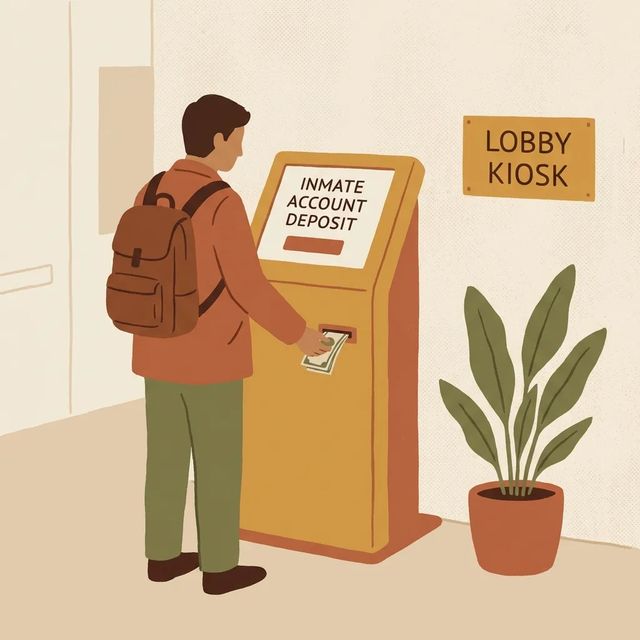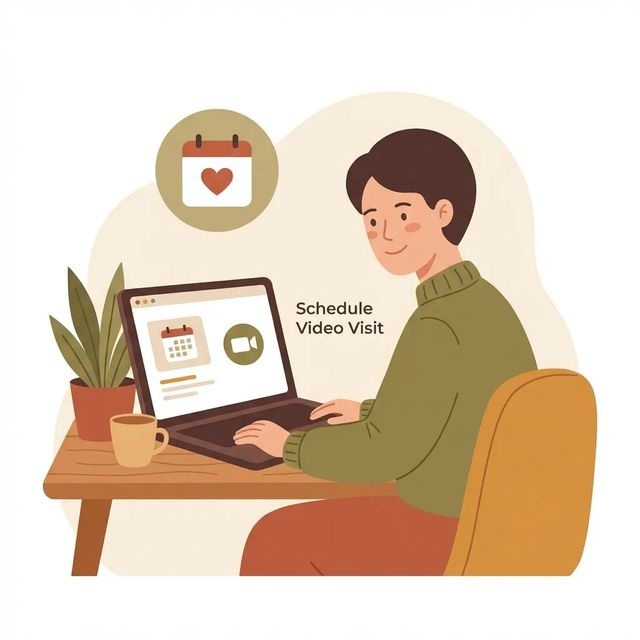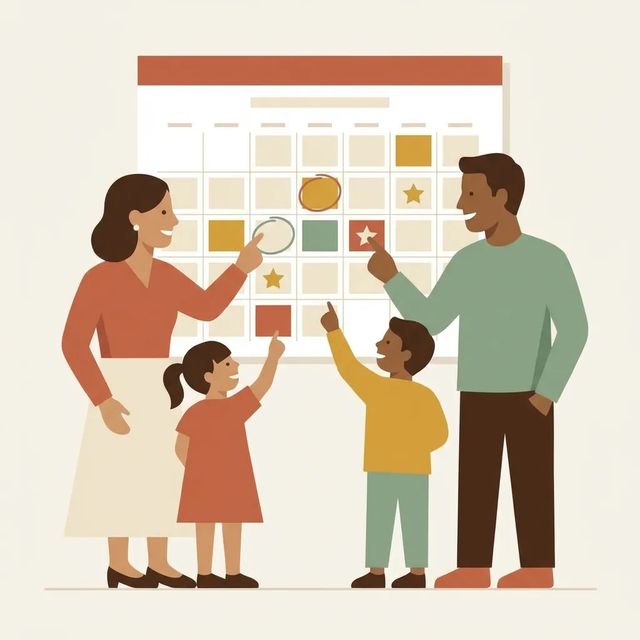Weber Co Jail
Explore
Find an Inmate at Weber Co Jail
Search for a loved one and send messages and photos in minutes.

Guides for This Facility

How to send money to someone at Weber County Jail: lobby kiosk vs. online
Weber County Jail offers two ways to add money to someone's Inmate Trust Account (also called their
Read Guide
Scheduling your first video visit at Weber County Jail (step-by-step)
Scheduling your first video visit can feel overwhelming when you want to get it right. Here's exactly how Weber County Jail's process works, plus tips to avoid common snags on visit day.
Read Guide
Weber County Jail visiting hours — days, times, and how to avoid wasted trips
Visiting someone in jail gets a lot easier once you know the schedule—and the gotchas that trip people up. Here are the current public visitation days and times for Weber County Jail, plus appointment rules and lobby hours you'll want to know before you go.
Read GuideAt a Glance
Visitation
- The facility does not hold public visits on Sundays and has no public visiting on Wednesdays.
- Adult visitors must present a valid form of identification to visit.
- The jail limits the number of visitors to three per inmate in the visiting area at one time.
Communication
- Classified inmates may have one or two 25‑minute video visits per week depending on classification.
- Visitors must schedule video visits at least one day in advance in the jail lobby.
- Weber County Jail uses Securus Video Connect for web-based video visiting that supports participation via app or computer.
Mail & Letters
- Weber County Jail accepts mail only via USPS and only white pre-stamped or metered postcards are allowed.
- Mail with envelopes, photographs, or adhesive stamps will be returned and mail will not be accepted at the lobby.
- All incoming and outgoing mail is screened for contraband and may be subject to content and format rules.
Sending Money
- Friends and family can deposit money at the jail lobby kiosk using cash or credit.
- You can add funds online at inmatecanteen.com for Weber County Jail inmates.
- Processing fees apply to kiosk and online deposits.
Inmate Lookup
- Weber County Jail publishes an online roster of inmates with names and dates on its roster page.
- Online inmate rosters vary by agency in which records appear and how often they refresh.
- When searching, have the person’s full name, known aliases, date of birth, and any booking or inmate ID available.
Contact Info
- The ADA Coordinator is Sergeant Anderson: panderson@webercountyutah.gov.
- Phone contact for the ADA Coordinator is 801-778-6600.
- Mail correspondence can be sent to Weber County Sheriff’s Office, Attn: Sergeant Anderson, 1400 Depot Drive, Ogden, UT 84404.
Facility Info
- Medical staff are on duty at the Weber County Jail 24 hours per day.
- Inmates may be assigned facility work such as culinary, library, custodial, and laundry for a small hourly stipend.
- ADA grievances must be submitted within 60 days to the Jail ADA Coordinator, who will meet and respond within 15 calendar days.
Based on official sources and community feedback. Learn how we verify
Topic Overviews
Visitation
Visiting at Weber County Jail takes some planning, especially your first time. The jail posts visiting days and hours on its website, but there are no public visits on Sundays or Wednesdays. Hours can also vary by inmate classification. Adult visitors need a valid photo ID and must follow the jail's dress code, including restrictions on prohibited clothing. Only three people can visit an inmate at one time, and all visits are monitored and recorded. Cell phone use, taking pictures, and initiating three-way calls during visits are prohibited—any of these can get your visit suspended. One heads-up: lobby and kiosk hours are posted on different pages and don't always match, so double-check before you go.
Read full guideCommunication
Staying in touch with someone at Weber County Jail happens mainly through video visits, phone calls, and electronic messaging. Classified inmates can receive one or two 25‑minute video visits per week, depending on their classification. Schedule at least one day in advance at the jail lobby. The jail uses Securus Video Connect—you can join from the Securus app or a computer. Phone service is outgoing only, using prepaid or debit options. Incoming calls aren't accepted. Add telephone funds through Securus at securustech.net or by calling them directly. For inmate email, go to securustech.online/#/login. Fees apply.
Read full guideMail & Letters
Weber County Jail only accepts mail sent through USPS on a white, pre‑stamped or metered postcard. Anything in an envelope, photos, or postcards with adhesive stamps will be returned. You can't drop mail off in the lobby. All incoming and outgoing mail is screened for contraband and must follow the jail's format and content rules. Legal mail is typically handled under separate procedures. Before sending anything, confirm the correct inmate mailing address on the facility page and stick to the postcard‑only format. Always include your full name and complete return address.
Sending Money
Weber County Jail offers two ways to add money: the lobby kiosk (cash or credit) or online at inmatecanteen.com. Processing fees apply to both. Deposits go into the inmate's Inmate Trust Account, which covers commissary items, snacks, and phone time. Inmates can order from commissary once per week using trust account funds. Stick to the facility's listed deposit options and approved vendors to avoid rejected or lost funds. After depositing, keep an eye on your vendor account—some accounts go inactive and may require follow-up if you need a refund.
Read full guideCommon Questions
Showing 6 of 22What ID do I need to visit someone at Weber County Jail?
Adult visitors need a valid photo ID. Check the facility's instructions for accepted forms of ID when you schedule or arrive.
VisitationHow many people can visit an inmate at one time?
Weber County Jail limits the visit to three people per inmate in the visiting area at one time.
VisitationAre visits monitored and can I use my phone during a visit?
Yes. All visits are monitored and recorded. Cell phone use, taking pictures, and making three-way calls during visits are prohibited and may get the visit suspended.
VisitationHow do I schedule a clergy visit at Weber County Jail?
Clergy visits must be scheduled at least 24 hours in advance by calling the jail. The facility’s site lists more than one phone number for clergy scheduling, so verify the number on the specific page you’re using.
VisitationHow do I schedule a video visit at Weber County Jail?
Schedule the video visit at least one day in advance in the Weber County Jail lobby. Video visits are handled through Securus Video Connect, which you can use from the Securus app or a computer.
CommunicationCan inmates receive incoming phone calls at Weber County Jail?
No. Inmate phones at Weber County Jail only allow outgoing prepaid or debit calls, and incoming calls are not accepted.
CommunicationMore Guides
Ready to Connect?
Search for your loved one to start communicating today
Did You Know?
Weber Co Jail posts its visiting schedule in the facility visiting rules PDF. You'll find public visitation days and hours listed there.
This guide is based on feedback from 66 families and official facility documentation. Learn how we verify
